From Pius XII to Vatican II: The Hidden History of a Key Church Epoch
In this interview, Inside the Vatican talks with Fr. Charles Theodore Murr, author of The Godmother: Mother Pascalina: A Feminine Tour de Force (2017). Fr. Murr is a former secretary to Edouard Cardinal Gagnon and worked at the Vatican in the 1970s. During this time, Murr befriended Mother Pascalina Lehnert, the housekeeper of Pope Pius XII for 41 years, from his time as Papal Nuncio in Germany to his death as Pope in 1958. The Godmother recounts many of their encounters in the 1970s, with topics ranging from serious Church news and issues to a lighthearted and humorous attending of a stage performance of The Pirates of Penzance.
Fr. Murr sits with Inside the Vatican and gives us a look into his life, the life of Mother Pascalina, and a bird’s-eye view of events that happened inside the Vatican.
The second half of this interview will be sent later this week.
The entire interview is printed in the October issue of Inside the Vatican magazine and now would be a great time to join us as a subscriber. As a reader of the Moynihan Letters, I offer you $10 off the $49.95 subscription price. Use coupon code: “letters“. Go here to subscribe. Thank you and I hope you enjoy this very interesting interview. –Robert Moynihan
By Kevin Symonds
https://kevinsymonds.com/
Fr. Murr, thank you for sitting with Inside the Vatican for this interview about your book The Godmother: Mother Pascalina: A Feminine Tour de Force. Before going into the book, would you mind telling us a little about yourself?
FR. CHARLES THEODORE MURR: Saint Paul, Minnesota is my birthplace. I was born in 1950, the eldest of seven children. I attended grammar schools and high school in Minnesota and college in Wisconsin, majoring in Romance languages.
When did you enter the seminary and who would you say was your biggest influence in getting you to consider the priesthood?
MURR: The rector of the Pontifical Mexican College in Rome admitted me as a lay student in 1972, when I was 22. I was in Rome to study classical philosophy, especially Aristotelian logic, and Latin and Italian, and to absorb every bit of European culture I could manage to take in.
It was Don Mario Marini, a minutante [a kind of secretary] of the Vatican’s Secretariat of State, who invited me to become a priest. This great personal mentor and outstanding example of a priest made it very clear, late one evening in 1975, that he was calling me to become a priest. I answered positively. Archbishop Francisco Javier Nuno y Guerrero of Guadalajara, the first bishop of San Juan de los Lagos, invited me to be ordained a priest for San Juan. I continued my studies at the Gregorian University and I was ordained in Rome on May 13, 1977, in the Basilica of Saints John and Paul, Monte Celio. Later, I worked in the Archdiocese of New York at the invitation of Cardinal O’Connor.¹
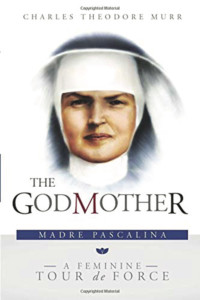 The Godmother: Mother Pascalina, A Feminine Tour de Force by Fr. Charles Theodore Murr, is available through Amazon. It was also recently translated into Italian and Spanish. Those editions are also available on Amazon.
The Godmother: Mother Pascalina, A Feminine Tour de Force by Fr. Charles Theodore Murr, is available through Amazon. It was also recently translated into Italian and Spanish. Those editions are also available on Amazon.
How much of an influence were your studies in Rome upon you and your priesthood?
MURR: Rome had a tremendous influence on me. Long before I was formally introduced to Rome at 17 years of age, the Eternal City was an integral part of me. I was an educated and proud-to-be-Roman Catholic. With French, Bavarian and Irish roots, Catholic was often used as a distinguishing adjective. When I later walked the streets of Rome and, after college, returned to study at 21, I took in everything I could, quickly made Roman friends, and learned Italian.
When you were studying in Rome, who were some of the most notable people that you came to know or befriend?
MURR: Among the most notable personages were, of course, Monsignor Mario Marini, and then-Cardinals Edouard Gagnon and Giovanni Benelli. Gagnon was from Montreal, Canada and the Rector of the Canadian College.² Benelli was from Tuscany and worked in the Secretariat of State as sostituto (substitute).³ Then there was Mother Pascalina Lehnert, CSC. She was the most impressive woman I ever met during those ten years. We both esteemed greatly a most impressive person: Eugenio Pacelli, Pope Pius XII.
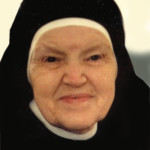 Yes, let us talk now about Mother Pascalina. How did you come to know her?
Yes, let us talk now about Mother Pascalina. How did you come to know her?
MURR: My first meeting with Mother Pascalina was in the fall of 1974, in Rome. I was 24. It was in the chaotic aftermath of [my] having been attacked by “Wolf,” her German shepherd. She immediately felt sorry for me. In spite of a badly torn cassock — perhaps because of it — our friendship was off to a very positive start.
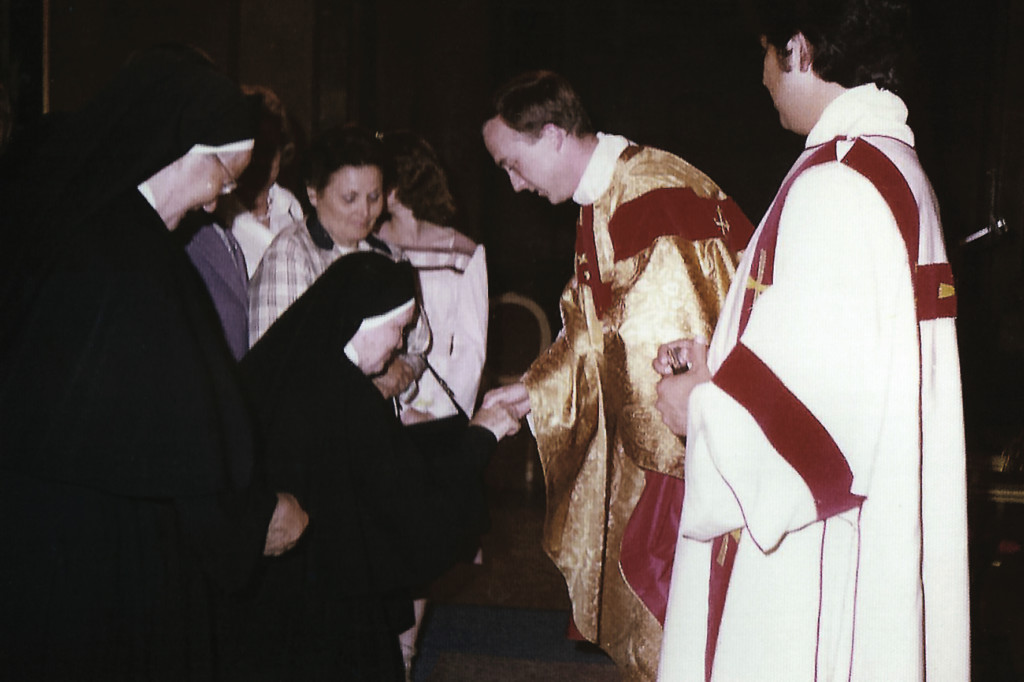
A young Father Murr and Mother Pascalina
Please tell us a little about her life and person.
MURR: Josefine was her baptismal name. She was born August 25, 1894, on the family farm in Ebersberg, Bavaria, the seventh of Georg and Maria Lehnert’s 12 children. Women religious “of yore” took their vocations most seriously. The “call” was Christ’s personal invitation to be His completely; to be joined to Him in a spiritual marriage. When a young woman entered religious life, or, as they say, “joined the convent” — which Josefine did at age 15 — she left the world behind, was given a new name — if you will, a new identity in Christ Jesus — and, rarely, if ever, made reference to her past life again. As a novice in the Congregation of the Holy Cross, Josefine Lehnert would now be known as Sister Pascalina (from the Latin for Easter: Pascha). As for her personality, she was a no-nonsense woman. Straightforward — most of the time. She would not tolerate lies or false criticisms of Pope Pius XII such as that he “hated the Jews,” or that he “secretly sided with the Nazis in WWII.” She became indignant and would rush to the Pope’s defense with facts and figures. Even in old age, she remained a sharp and clear thinker. In our 8-year friendship, I always found her loving, maternal, unselfish, concerned for others, pious, a woman of true, deep faith, Catholic to the core.
Some people refer to Sister Pascalina as “Mother” Pascalina — which form is correct, or are they both accurate?
Officially, it is and has always been “Sister.” Unofficially, however — yet absolutely true to Roman form, called Romanità— when Cardinal Eugenio Pacelli became Pope Pius XII in 1939, his personal secretary, Sister M. Pascalina Lehnert, was immediately “promoted” to “Reverenda Madre” by most of the Vatican’s Curia members. It was a very Latin, very Roman, mark of respect. When she protested the impropriety of her new title to Pope Pius, he laughed and joked that she should consider it the closest thing the Church (or he) could do to making her a Monsignor!
Sister Pascalina is mentioned, and portrayed unfavorably, in John Cornwell’s notorious polemic, Hitler’s Pope. Have you read this book, and what would Mother say in response, to both its portrait of her and its no-holds-barred attack against Venerable Pius XII?
MURR: It doesn’t surprise me in the least to learn of Mr. Cornwell’s unfavorable portrayal of Sister Pascalina Lehnert in his book. I believe anyone low enough to call the one man on earth who did more than anyone else in all of human history to save the Jewish people from extermination, “Hitler’s Pope,” would be shameless enough to hold God Himself in contempt. I willingly admit to never having read Mr. Cornwell’s book, nor do I ever intend reading it. I have, however, read The Myth of Hitler’s Pope by David Dalin, and therefore have a good idea what it is Cornwell alleges in his own book.
I’ve heard every criticism of Pope Pius XII since Hochhuth’s play The Deputy came out in 1964, to just recently, when another malcontent had the temerity to share “the well-known fact” that, as a young man, Eugenio Pacelli cheated at polo! I try to keep in mind Fulton J. Sheen’s caveat: “What a man says is not as important as why he says it.” In time, perhaps Cornwell’s truer, more personal motives for slandering Pope Pius XII will become evident — that is, besides his obvious anti-Catholicism.
What would Sister Pascalina say about Cornwell’s opinion of her? Not a word. Maybe a slight roll of the eyes, but not a word. Part of the “secret of her success” was her humility. True humility lets you know the truth of yourself and once you know that, you’ve practically got it made. In fact, in the case of Mother Pascalina — irony of ironies — her humility would make her “proud” to endure another insult in defense of her saintly friend.
The late journalist Paul Murphy published the 1983 book La Popessaabout Sister Pascalina. Dr. Martha Schad, Sister Pascalina’s biographer, thought that La Popessa was a lurid “fairy tale.” What is your opinion on this matter?
MURR: To categorize Paul Murphy’s book, La Popessa, as a “lurid fairy tale” shows a great degree of restraint and kindness — even mercy — on the part of Dr. Schad. In 1983, I was in JFK Airport on my way to Rome when I entered a newsstand. Right in front of me were stacks of books with Mother Pascalina’s photo on them! Mother Pascalina, the very woman I would be sitting with and visiting soon after I got to Rome! Naturally, I bought a copy and, though it was some of the worst fiction I had ever read, I finished it before we landed at Leonardo Da Vinci. Two days later I met Mother at Pastor Angelicus. She asked me: “Have you seen my book? It was just released!” I remember being shocked. “You’re pleased with that book?” I asked, “I read it on the plane and…”
She knew at once, by the expression on my face and the tone in my voice, that we were not talking about the same book. “No, no, no,” she exclaimed, “the book I have been working on for years; about the Holy Father!” and, without missing a beat she gave a wave of her hand and said, “Not that garbage [book]!” She explained that some months before, Mr. Murphy had asked to see her under false pretenses. When, after a few awkward minutes, she figured this out, she dismissed him unceremoniously. Mother then proceeded to tell me how elated she was with Ich durfte ihm dienen: Erinnerungen an Papst Pius XII, her new book!
 William Doino Jr., a Pius XII expert, wrote a review of Sister Pascalina’s memoirs entitled “La Popessa Speaks.”⁴ Have you read either her memoirs, Doino’s article, or both?
William Doino Jr., a Pius XII expert, wrote a review of Sister Pascalina’s memoirs entitled “La Popessa Speaks.”⁴ Have you read either her memoirs, Doino’s article, or both?
MURR: Doino gives a splendid presentation of Mother Pascalina’s book His Humble Servant. For those whose German is not quite up to snuff — myself among them — this long-awaited English translation of the [1983] German memoirs is remarkable both in content and style. I don’t know if Mr. Doino ever had the opportunity to meet Mother in person, but he certainly seems to know and represent her well.
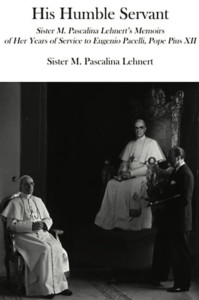 What did Sister Pascalina tell you about Pope Pius XII that most people do not know? We know she was interviewed by those responsible for Pius XII’s Cause and she supported his canonization. What would she say in response to those who say he was a deeply flawed Pope, and no saint or hero? Did she ever reveal to you any concrete actions Pius XII took to rescue persecuted Jews?
What did Sister Pascalina tell you about Pope Pius XII that most people do not know? We know she was interviewed by those responsible for Pius XII’s Cause and she supported his canonization. What would she say in response to those who say he was a deeply flawed Pope, and no saint or hero? Did she ever reveal to you any concrete actions Pius XII took to rescue persecuted Jews?
MURR: Simply put: to know Mother Pascalina was to know His Holiness, Pope Pius XII. The admiration in the tone of her voice as she recounted this or that story about him; the sparkle in her eyes as she described his kindnesses and virtues; the smile on her face when she shared one of his many witticisms and humorous anecdotes, and the love and respect for him that she manifested when, on more than one occasion, she shared her photograph collection of the pontiff — particularly photos of him smiling. What a warm and inviting smile the Pope had; enough to melt the heart of an atheist. What I’m trying to say is that Mother Pascalina’s love and admiration of Pope Pius “softened” the rather strict, all-business image I had of him. Her authentic love and devotion to him “humanized” him for me — made him more accessible to me, especially in prayer. The saints, after all, are God’s friends and our friends; they are with us to bring us closer to God, the beginning and end of all friendship and all love.
To those who would dismiss Pope Pius XII as “deeply flawed and no saint or hero,” Mother Pascalina would almost certainly respond (with words similar to these): “Only someone who did not know the Holy Father at all; someone who obstinately refused to see the brilliance of his pontificate, examine the almost insurmountable challenges he took on daily, and the unsung accomplishments he won for humanity — not the least of which was the saving of hundreds of thousands of Jewish lives — would hold such an ignorant opinion of him.”
Below left, a young Father Murr with Pope Paul VI (1963-1978). Below right, a slightly older Fr. Murr with Pope John Paul II (1978-2005)
In The Godmother, Mother Pascalina is a humble yet very knowledgeable woman—one very attuned to the times. Could you tell us further about this aspect of her life?
MURR: In that “scientia est potentia,”5 Pascalina Lehnert was powerfully knowledgeable. It was her humility — true humility, knowing one’s self honestly — that kept her balanced. So rarely do you find a powerful man or woman who is, at the same time, authentically humble that, when you do, you know you’ve discovered an inestimable treasure. Why? Because, overwhelmingly, power and humility cancel each other out. When, however, an individual accepts the goal of power to be service, and the goal of humility to see truth, and incorporates them both, that individual is well on the way to becoming a saint. What’s more, these two goals, power and humility, are never completely at peace with one another; they never stop pestering each other. That on-going tension between them generates an impetus, a dynamic one that makes this spiritual “balancing act” virtuous.
As I say, it is extremely rare to find those who can balance power and humility. Pope Pius XII was one such individual; Mother Pascalina was another. Even when communicating a very strongly held conviction, Mother Pascalina expressed it with certainty and with calm. When you’re right, you’re right; what need is there for shouting? Fortiter in re; suaviter in modo.⁶
END NOTES
1 https://cardinals.fiu.edu/bios1985.htm#Oconnor.
2 https://cardinals.fiu.edu/bios1985.htm#Gagnon.
3 https://cardinals.fiu.edu/bios1977.htm#Benelli.
4 https://www.firstthings.com/web-exclusives/2014/10/la-popessa-speaks
5 Knowledge is power.
6 Resolute in execution; gentle in manner.

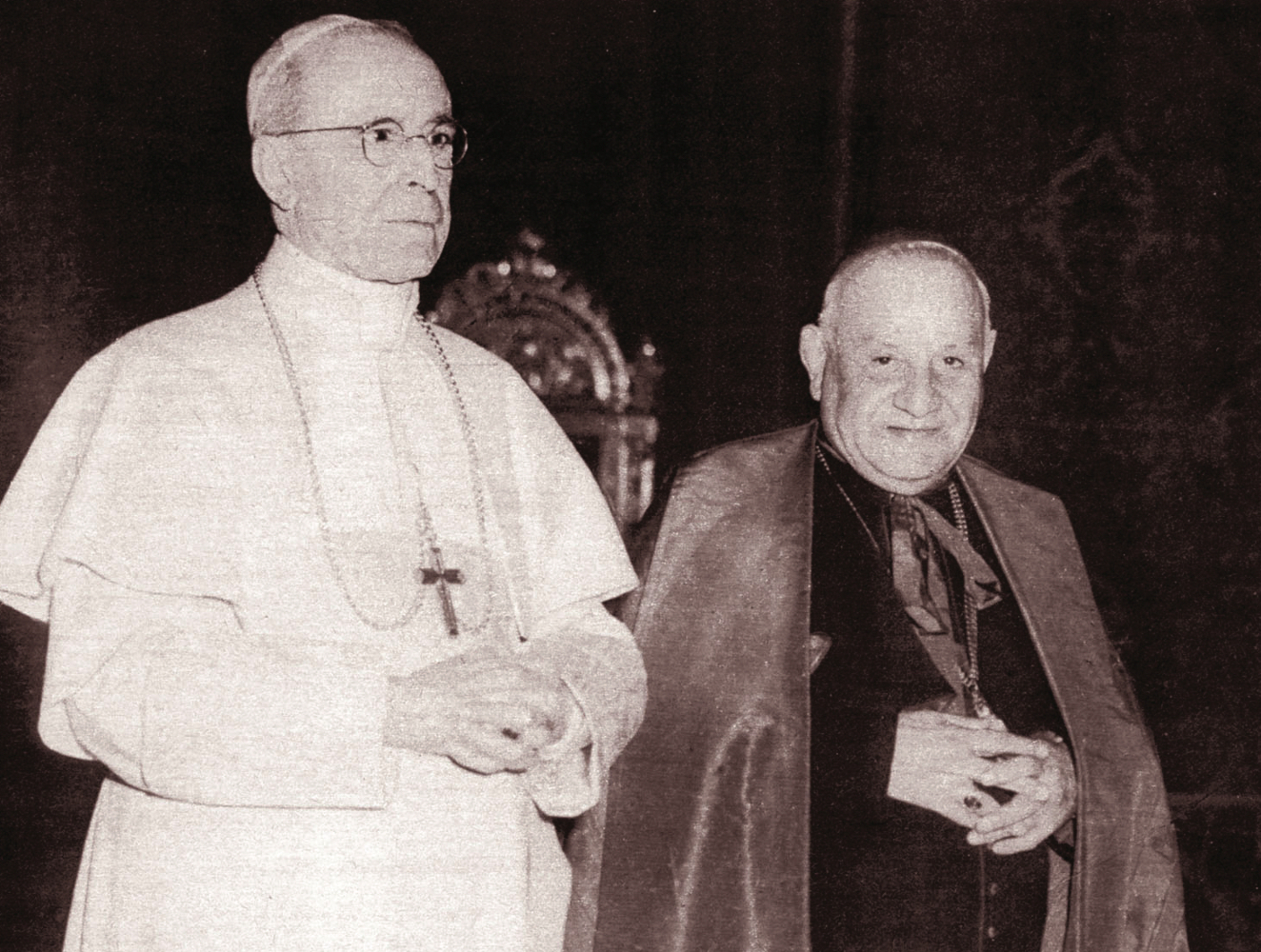
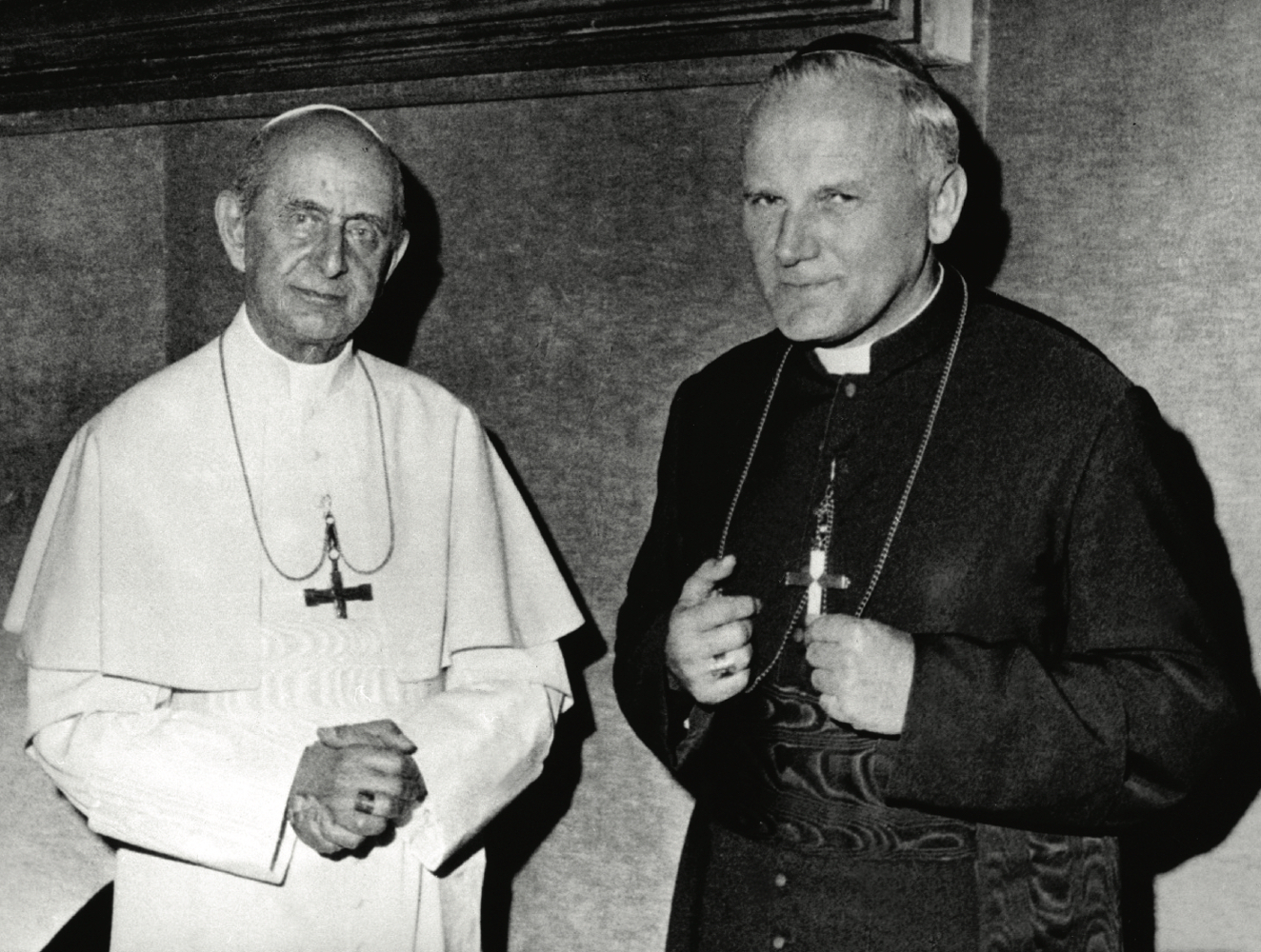
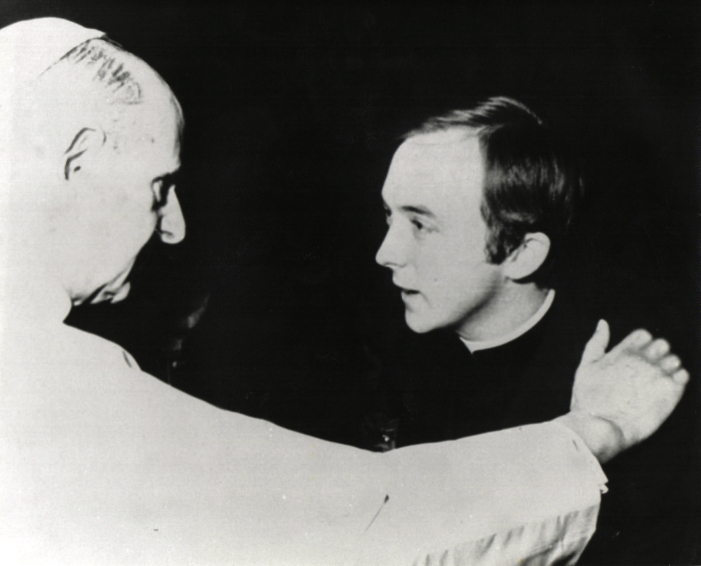
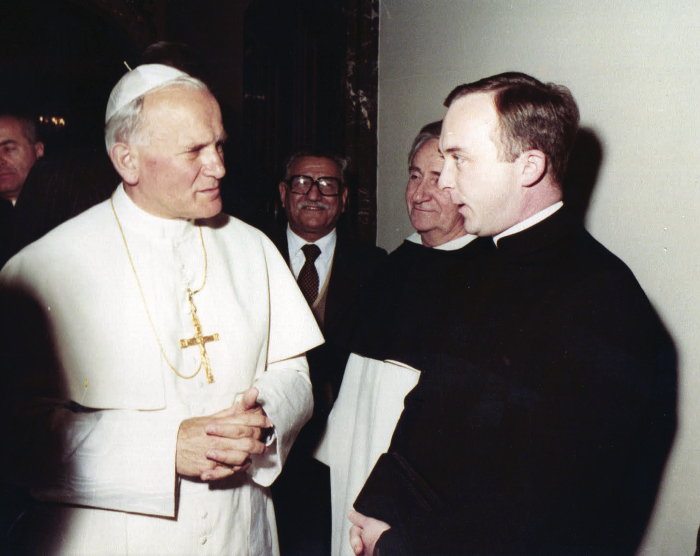




Facebook Comments